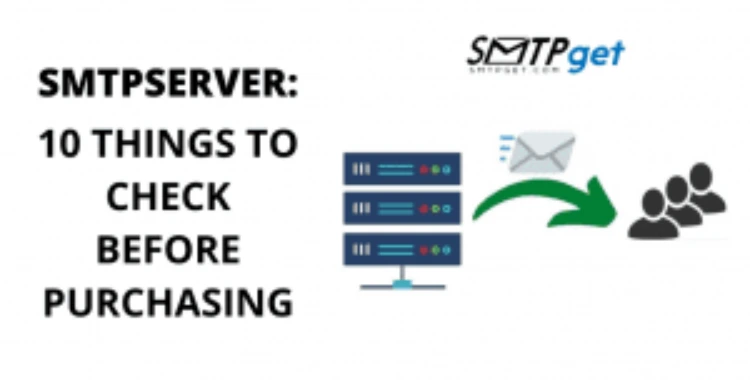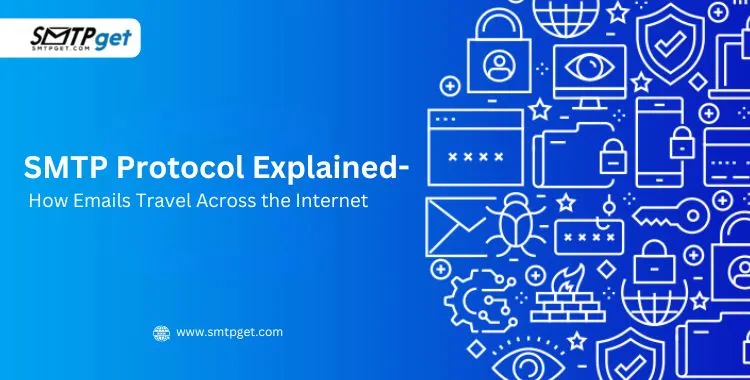Understanding SMTP Relay vs. SMTP Server is important when sending emails for business. Both play key roles in email delivery, but they serve different purposes. Choosing the right one depends on your business needs, like the volume of emails you send, security requirements, and whether you handle emails in-house or through an external service.

An SMTP server is the main tool for sending and receiving emails within a network. It’s commonly used by businesses that manage email delivery on their servers. An SMTP relay helps route emails from one server to another, making it ideal for sending high volumes of emails through third-party servers. In this blog, we’ll discuss SMTP Relay vs. SMTP Server, how each option works, its pros and cons, and how to choose the best fit for your business email strategy.
What is an SMTP Relay?
SMTP relay is a service that helps move emails from one server to another until they reach the recipient’s inbox. An SMTP relay acts like a “middleman” for emails: it takes an email from the sender’s server and passes it along to the recipient’s server. Businesses often use SMTP relay services when they need to send large volumes of emails, like newsletters or transactional emails.
This relay process ensures that emails are efficiently delivered without overloading the sender’s main server. Additionally, SMTP relay services often have advanced security and spam-checking features to help emails reach inboxes safely, reducing the chance of them landing in spam folders. Using an SMTP relay is ideal for businesses that want to maintain high email deliverability and avoid managing the technical details of email delivery on their own servers.
What is an SMTP Server?
SMTP server is a system that helps send and deliver emails across the internet. SMTP stands for Simple Mail Transfer Protocol, a set of rules for how emails move from one place to another. When you hit “send” on an email, the SMTP server takes over. It checks the recipient’s email address, finds the right destination, and sends the email on its way.
Think of the SMTP server as a digital mailman. It picks up your email, figures out where it needs to go, and ensures it gets there. If there’s an issue, like a wrong address, the SMTP server will notify you with an error message. SMTP Server Services are important for businesses and individuals who rely on email for communication. Without them, emails wouldn’t reach their destinations, making them a crucial part of any email system.
Key Differences Between SMTP Relay vs Server
When it comes to email delivery, both SMTP servers and SMTP relays are important, but they work in different ways. Knowing their differences can help you decide which is better for your business.
Functionality
SMTP Server: Manages all outgoing and incoming emails within a network.
SMTP Relay: Acts as a middleman, sending emails from one server to another, especially for external recipients.
Use Cases
SMTP Server: Suitable for businesses that manage emails in-house, with direct control over delivery.
SMTP Relay: Ideal for businesses sending high volumes of external emails, like marketing campaigns, using third-party servers.
Email Deliverability
SMTP Server: Offers direct control but may face deliverability issues if not properly configured.
SMTP Relay: Improves deliverability by leveraging trusted third-party servers to avoid spam filters.
Setup and Management
SMTP Server: Requires more setup and maintenance, especially for security and performance.
SMTP Relay: Simplifies email management, reducing in-house workload for large email volumes.
Security Control
SMTP Server: Provides full control over security settings.
SMTP Relay: This relies on the security protocols of the relay provider, which can offer additional protection.
Benefits of SMTP Server vs Relay
Here are the overview of SMTP Server vs Relay Benefits:
Benefits of Using an SMTP Relay
Using an SMTP relay Service can offer several advantages for businesses that rely on sending a high volume of emails. Here are the main benefits of using an SMTP relay:
Improved Email Deliverability:
SMTP relay services are designed to increase the chances of your emails reaching recipients’ inboxes. They reduce the risk of your emails being marked as spam, which helps improve deliverability rates.
Better Scalability:
If your business regularly sends Bulk Emails (like promotional or transactional emails), an SMTP relay can handle high email volumes with ease. It allows your email system to grow as your business grows, without interruptions.
Enhanced Security:
SMTP relay services often come with built-in security features like encryption and authentication. This helps protect your emails from being intercepted by hackers, keeping your sensitive information safe.
Efficient Resource Management
Using an SMTP relay frees up your internal servers from handling heavy email traffic. This helps keep your main server’s performance optimized, as it doesn’t have to manage email overloads.
Compliance with Email Standards
SMTP relays follow the latest email-sending standards and guidelines. This ensures your emails comply with global regulations, reducing the chances of them being blocked by major email providers.
Detailed Analytics and Tracking
Many SMTP relay services offer analytics tools that help you track email performance. You can monitor delivery rates, open rates, bounce rates, and more. This data can be essential for improving your email marketing strategy.
Easy Integration
SMTP relays are compatible with most email marketing platforms, CRM systems, and website contact forms. This means you can easily connect them to your existing setup and start sending emails right away.
Reduced Maintenance and Management
With an SMTP relay service, there’s less need for in-house maintenance. The relay provider manages the infrastructure, updates, and troubleshooting, allowing your team to focus on other tasks.
Benefits of Using an SMTP Server
Using an SMTP Server Provider has many advantages for businesses that rely on email for communication and marketing. Here are some key benefits of using an SMTP server:
Reliable Email Delivery:
SMTP servers ensure that emails are sent correctly, reducing the chances of messages getting lost or flagged as spam. This reliability helps make sure your important emails reach their destination.
Improved Security:
SMTP servers provide secure email transmission by using encryption. This helps protect sensitive data from being accessed by unauthorized users, which is especially important for businesses that handle customer information.
Better Control Over Emails
With an SMTP server, you have more control over your email settings and delivery. You can manage email authentication, track emails, and troubleshoot delivery issues. This level of control helps businesses monitor their email performance effectively.
Increased Email Sending Capacity
SMTP servers allow businesses to send a high volume of emails, making them ideal for email marketing, transactional emails, and newsletters. For companies that need to send bulk emails, an SMTP server is essential.
Reduced Bounce Rates
An SMTP server can handle email delivery errors and adjust settings to improve deliverability. By ensuring messages are sent from a reliable server, it helps lower the chances of emails bouncing back.
Enhanced Reputation Management
Emails sent from a dedicated SMTP server are less likely to be marked as spam, as these servers often meet high security and authenticity standards. This helps maintain your business’s email reputation and ensures your messages are trusted by recipients.
Detailed Reporting and Analytics
Many SMTP servers offer analytics and reporting features. These tools provide insights on delivery status, open rates, and bounce rates, helping businesses understand their email performance and improve future campaigns.
Cost-Effective for Businesses
For businesses that send frequent emails, an SMTP server can be a cost-effective solution. By investing in a dedicated SMTP server or using a reliable SMTP service provider, businesses save on the costs associated with undelivered or rejected emails.
When to Choose an SMTP Server
Choosing a Dedicated SMTP server can be a great solution for businesses that handle email in specific ways. Here are some key situations when an SMTP server might be the best choice:
1. If You Send Large Volumes of Emails Regularly:
Businesses that frequently send large volumes of emails (like newsletters or transactional emails) often benefit from using an SMTP server. It provides reliability and can manage high traffic efficiently without interruptions.
2. For Full Control Over Email Delivery:
With an SMTP server, you have complete control over the process of sending and receiving emails. This control can help you manage and customize email settings, apply security measures, and troubleshoot issues directly.
3. When Data Privacy Is a Priority:
For industries like finance, healthcare, or legal services, data privacy is critical. By using an in-house SMTP server, you can keep sensitive data within your organization and reduce exposure to third-party servers, improving privacy and data protection.
4. If You Want Customization Options:
SMTP servers allow you to customize email delivery settings, such as authentication protocols and filtering rules. This flexibility is useful if your business requires unique configurations or specific email features tailored to your needs.
5. For Enhanced Security Control:
Having an SMTP server in-house means you can implement custom security measures, like encryption and secure login, to protect your emails from external threats. This is valuable if your business needs a high level of email security.
6. If You Need Reliable Deliverability Rates:
SMTP servers are designed to ensure high deliverability. This is important for businesses that rely on bulk email marketing services or customer notifications, as it helps ensure that emails reach the inbox rather than being marked as spam.
When to Choose an SMTP Relay
Choosing an SMTP relay can make a big difference in your email delivery, especially for businesses that send a lot of emails. Here’s when an SMTP relay is the right choice for you:
1. Sending High Volumes of Emails:
If your business sends many emails daily, like newsletters, promotions, or transaction updates, an SMTP relay is ideal. It helps you manage large volumes without overloading your server.
2. Improving Email Deliverability:
SMTP relay services have systems to ensure your emails reach inboxes and avoid spam folders. This is essential for businesses that rely on consistent email communication with customers.
3. Outsourcing Email Infrastructure:
Managing your own email server can be costly and complex. An SMTP relay provider manages the infrastructure, saving you time and reducing the need for technical expertise.
4. Reducing IP Blacklisting Risks:
SMTP relays often use multiple IP addresses, which can help reduce the risk of blacklisting. This is helpful if you’re concerned about deliverability issues due to previous blacklisting.
5. Maintaining Email Security:
Many SMTP relay providers offer extra security layers, such as encryption and authentication. These features protect your emails and customer data, making it a safer choice for businesses handling sensitive information.
6. Ensuring Compliance with Email Regulations:
If you’re sending emails to customers in different regions, an SMTP relay can help you comply with international email laws, such as GDPR. Providers often have systems to manage compliance for you.
7. Tracking and Analyzing Email Performance:
SMTP relay providers offer detailed analytics on email performance. This allows you to monitor delivery rates, open rates, and bounce rates, helping you improve your email strategy over time.
8. Scaling Easily as Your Business Grows:
As your business expands, your email needs may grow too. SMTP relays are scalable, so they can handle increased volumes without needing to invest in more infrastructure.
Security Considerations for SMTP Servers
When using SMTP servers to send and receive emails, security is crucial. Here are key points to consider for keeping your email communications safe:
- Use Strong Authentication: Ensure that your SMTP server requires strong authentication methods, such as passwords or two-factor authentication (2FA). This helps prevent unauthorized access.
- Encrypt Your Emails: Use encryption protocols like TLS (Transport Layer Security) for emails in transit. This protects email content from being intercepted during transmission.
- Limit Access: Control who can access your SMTP server. Connect only with trusted users and devices. This reduces the risk of abuse.
- Regular Updates: Always keep your SMTP server software updated. Regular updates provide essential security patches to protect against recognized vulnerabilities.
- Implement Rate Limiting: Set limits on how many emails can be sent in a certain timeframe. This helps prevent spam attacks and protects your server from overload.
- Monitor Logs: Regularly check your SMTP server logs for unusual activity. Monitoring can help you spot unauthorized access or potential attacks early.
- Use SPF, DKIM, and DMARC: Implement these email authentication protocols to verify that your emails are legitimate and reduce the chances of your emails being marked as spam.
- Firewall Protection: Use firewalls to protect your SMTP server from external threats. A good firewall can block unwanted traffic and secure your server.
- Back-Up Regularly: Regularly back up your server data and configurations. This ensures you can restore your system quickly if there’s a security breach.
Security Considerations for SMTP Relays
Using SMTP relays can enhance your email delivery, but it’s crucial to consider security to protect your business and customers. Here are some key security considerations for SMTP relays:
- Authentication: Always require authentication for users sending emails through the SMTP relay. This helps ensure that only authorized users can access the relay, reducing the risk of abuse or spam.
- Encryption: Use encryption protocols like TLS (Transport Layer Security) to secure the email data in transit. This prevents hackers from intercepting sensitive information as it travels over the internet.
- IP Whitelisting: Limit access to the SMTP relay by whitelisting specific IP addresses. This means only users from approved IP addresses can send emails through the relay, which adds an extra layer of security.
- Rate Limiting: Implement rate limiting to control the number of emails sent within a specific time frame. This helps prevent abuse, such as spamming and ensures the relay remains functional for legitimate users.
- Monitoring and Logging: Regularly monitor and log activities on your SMTP relay. Keeping track of who is sending emails and when can help identify any unusual behavior, allowing you to respond quickly to potential security threats.
- Anti-Spam Measures: Use anti-spam features to filter out unwanted emails. This protects your users and improves the overall reputation of your sending domain.
- Regular Updates: Keep your SMTP relay software updated to protect against known vulnerabilities. Keeping your software updated guarantees that you benefit from the newest security features and fixes.
- User Training: Educate your team about email security best practices. Ensuring that everyone understands the importance of secure email handling can help prevent accidental breaches.
- Backup Solutions: Have a backup plan in place for your SMTP relay. In case of a failure or security breach, having a backup can help maintain email functionality and protect important data.
Performance and Reliability: SMTP Server vs. SMTP Relay
When choosing between an SMTP server vs SMTP relay for email delivery, performance and reliability are crucial factors to consider. Here’s a breakdown of both options:
SMTP Server
- Control: With an SMTP server, you have full control over your email settings and configurations. This allows for optimized performance tailored to your needs.
- Speed: Sending emails directly from your server can be faster, especially if you have a high-speed internet connection. This reduces the chances of delays in email delivery.
- Reliability: If managed correctly, an SMTP server can provide reliable email delivery. However, it requires proper maintenance and monitoring to ensure consistent performance.
- Cost: Running your own SMTP server can be cost-effective for larger businesses that send a high volume of emails.
SMTP Relay
- Scalability: An SMTP relay is often more scalable than an SMTP server. It can handle large volumes of emails, making it suitable for businesses that send bulk emails.
- Deliverability: SMTP relays are designed to improve email deliverability. They use multiple servers to send emails, reducing the risk of getting marked as spam.
- Maintenance: Using an SMTP relay means less maintenance for your team. The service provider manages server uptime and performance, allowing you to focus on your business.
- Cost: SMTP relay services usually charge based on the number of emails sent, which can be economical for businesses with fluctuating email volumes.
Conclusion- Making the Right Choice for Your Business
In conclusion, choosing an SMTP Relay vs SMTP Server is Important for your business. Both options have their strengths and weaknesses, so it’s essential to assess your specific needs. If your business sends a high volume of emails, an SMTP relay can help manage that load efficiently and improve delivery rates. It also offers added features like tracking and analytics.
On the other hand, if you prefer more control and security, an SMTP server might be the better choice. It allows you to manage your email system in-house and customize it to fit your requirements. Consider factors like email volume, security, budget, and technical expertise when making your choice. By carefully evaluating these elements, you can select the option that best supports your email communication strategy and helps your business grow effectively. Making the right choice will lead to better email deliverability and enhance your overall business performance.







